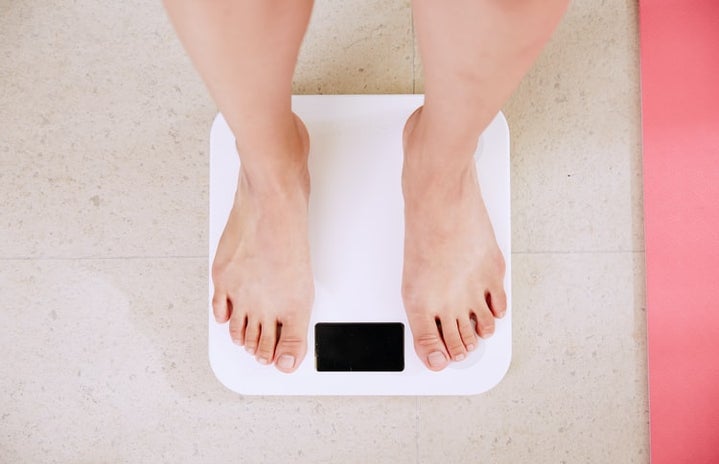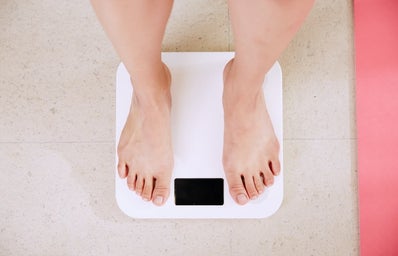Content and Trigger Warning: This article discusses disordered eating, body dysmorphia, and mentions caloric intake and specific numbers. If this is triggering for you, please exercise self-care and close out.
I became conscious of my weight when I was twelve. I was going through puberty, and the inevitable weight gain made me self-conscious, as everyone seems to be at that age. So, I began restricting my calorie intake in the hopes of regaining my tiny frame. At the time, this pattern of disordered eating seemed like a game to me: how much could my weight fluctuate throughout the day? How little could I get away with eating? How small around could my thighs get? I had no idea what this “game” would do to my mental health for years to come.
Throughout high school, my eating habits and weight fluctuated a lot. I began experiencing body dysmorphia, seeing myself as huge, when in reality, my max weight was a whopping 112 pounds. I hid this struggle from my friends and family because of the stigma surrounding eating disorders. I was very much an overachiever in high school, so I wanted people to think of me as capable and put together; I didn’t want to be perceived as broken.
While I am in no way endorsing the isolation I went through, my desire to go unnoticed prevented me from getting too physically unhealthy. As I was about to go to college, though, I became worried. I would have no adults in my life looking after me. I vowed to make a conscious effort to eat — as easy as that may sound, the temptation to restrict my diet, in addition to the threat of the freshman fifteen, made it difficult.
At first, I did really well. My class schedule allowed me to develop a regular eating schedule, too. I thrived during my first semester. Eating three full meals per day and walking to class helped keep off any extra weight. But then, the sluggishness of college life really hit. I was drowning in assignments, and my general motivation to just do human things went down the drain. I started skipping meals; however, because of stress and a new medication, I was actually gaining weight. These two factors combined brought back thoughts of feeling like I wasn’t good enough. In my mind, if I were good enough, I would’ve been losing weight.
I realized I had been equating the number on the scale with my worth as a human being, where higher numbers meant I was worth less. This also translated into other areas of my life, mainly my education. No matter how well I did on an assignment, it felt like everyone was smarter than me and I didn’t actually belong at UNC.
Through therapy and medication, I was able to combat the general depression I felt, but it didn’t change my negative body image. I would stand in front of the mirror every night and just pinch the parts of me I wished would disappear. Sure, I was eating a “healthy” amount, but I felt guilty with every bite. It was as if I could physically feel the fat appearing on my body each time I swallowed another mouthful.
Now, at the beginning of my junior year, I wish I could tell you that I’m completely cured, but I’m not. I still experience body dysmorphia, I still occasionally pick apart my every “flaw” in the mirror, and I still worry about the number on the scale. However, I am happy to report that my relationship with food is much healthier. I eat when I feel like it, not just when I feel like I’ve earned it. Eating makes me feel good instead of unworthy.
Wherever you’re at in your journey with weight, body image or eating disorders, please know that healing is a process. You’re not going to magically “get better,” and there is no universal “cure.” You’re going to move at your own pace and find that different things work for you. Just know that it does get better, little by little, and your care is worth fighting for.


